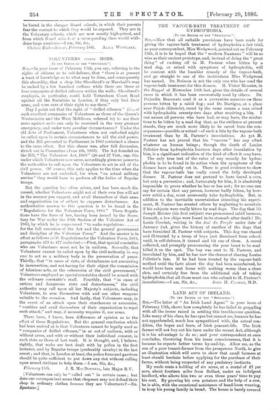VOLUNTEE RS versus MOBS. [To THE EDITOR OF THE "SPECTATOR."]
SIR,—In your issue of February 13th, you say, referring to the rights of citizens as to self-defence, that "there is at present
a want of knowledge as to what may be done, and consequently this absurdity, that a shop like Shoolbred's or Marshall's may be sacked by a few hundred ruffians while there are three or four companies of drilled riflemen within the walls. Shoolbred's employes, in particular, could hold Tottenham Court Road against all the Socialists in London, if they only had their arms, and were sure of their right to use them."
May I point out that the right of "drilled riflemen" (i.e., of
such excellent companies of Volunteers as those of the Queen's Westminster and the West Middlesex referred to) to use their arms against mobs can only be exercised in the very greatest emergency, and under very peculiar circumstances ? Under the old Acts of Parliament, Volunteers when not embodied might be called upon in certain circumstances to aid the civil power, and the Bill presented to Parliament in 1863 contained a clause to the same effect. But this clause was, after full discussion, struck out in Committee (June 4th, 1863). The Act founded on the Bill, "The Volunteer Act, 1863" (26 and 27 Viet., cap. 65), under which Volunteers now serve, accordingly gives no power to the authorities to call upon the Volunteers to act in aid of the civil power. Of course, this only applies to the time when the Volunteers are not embodied, for when "on actual military service" they would have to perform all the duties of Regular troops.
But the question lia.s often arisen, and has been much dis- cussed, whether Volunteers might not of their own free will act in the manner you suggest, and avail themselves of their arms and organisation (or of either) to suppress disturbances. An authoritative answer to this question is to be found in the "Regulations for the Volunteer Force, 1884." These Regula- tions have the force of law, having been issued by the Secre- tary for War under the 16th Section of the Volunteer Act of
1863, by which he is empowered "to make regulations for the full execution of the Act and the general government and discipline of the Volunteer Force." And the answer is in effect as follows (vide Regulations for the Volunteer Force, 1881, paragraphs 473 to 477 inclusive) :—First, that special constables who are Volunteers must not be in uniform. Secondly, that Volunteers cannot be called upon by the civil authority in any case to act as a military body in the preservation of peace. Thirdly, that "in cases of riots, of disturbances not amounting to insurrection, and not having for their object the commission of felonious acts, or the subversion of the civil government," Volunteers employed as special constables should be armed with the ordinary constable's staff. Fourthly, that "in cases of serious and dangerous riots and disturbances," the civil authority may call upon all her Majesty's subjects, including Volunteers, to arm themselves with and use other weapons suitable to the occasion. And lastly, that Volunteers may, in the event of an attack upon their storehouses or armouries, "combine and avail themselves of their organisation to repel such attack," and may, if necessity requires it, use arms.
There have, I know, been differences of opinion as to the effect of these Regulations. But the general conclusion which has been arrived at is that Volunteers cannot be legally used as
"companies of drilled riflemen," in or out of uniform, with or without arms, and with or without their individual consent, in such riots as those of last week. It is thought, and, I believe, rightly, that mobs are best dealt with by police in the first instance, and by Regular troops (preferably cavalry) in the last resort ; and that, in London at least, the police force and garrison should be quite sufficient to put down any riot without calling upon armed civilians to help them.—I am, Sir, dtc., February nth. J. R. MAcDoNNELL, late Major R.V.
[Volunteers can only be "called out" in certain cases ; but does our correspondent mean that shopmen may not defend their shop in ordinary clothes because they are Volunteers P—En. Spectator.]


































 Previous page
Previous page